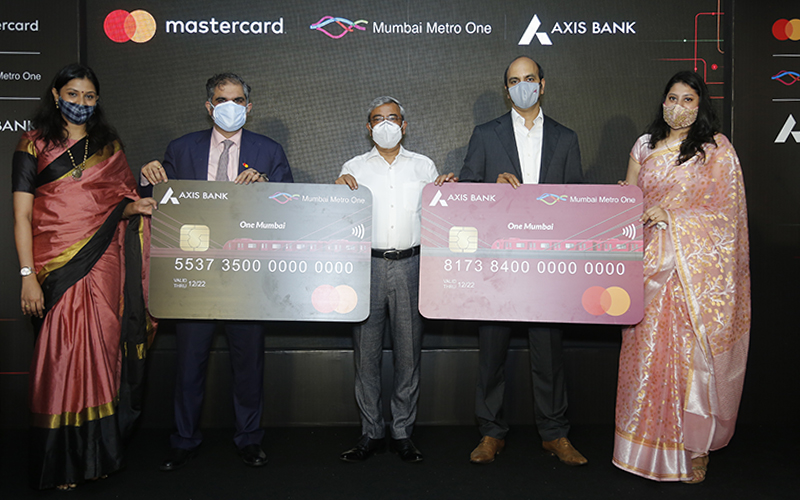July 8, 2021
- The initiative aligns with the government’s goal to build a future-ready public infrastructure with connectivity, productivity, sustainability and safety
Axis Bank, Mumbai Metro and Mastercard today announced the launch of ‘One Mumbai Metro Card’, to ensure contactless and cashless travel for Mumbaikars. It is a prepaid, open loop contactless card which can be used
as a part of the daily transit journey with just a tap. With this solution, Mastercard has continued to contribute in changing the way India commutes and helping the transit eco-system go completely digital. This is a card that can be used
for all daily purchases from food, groceries, medicines as well as tickets.

Mastercard’s solution gives transit agencies the ability to design, develop and deploy customized prepaid digital payment solutions, delivering essential contactless transit experience to riders. This is another step in helping the government
digitise transport and build the country’s digital economy, backed by the highest standards of safety that Mastercard is known for.
The ‘One Mumbai Metro Card’ offers salient features such as contactless, simplicity of use and top-up, speed and convenience for one’s metro fare as well as other daily spends such as grocery, restaurants and
shopping. It is relevant in facilitating safe and seamless metro commute without the need to queue up anywhere, in times of social distancing and for hassle-free daily payments. One can get the ‘One Mumbai Metro Card’ from Mumbai Metro Station counters.
Commenting on the launch, Mr. Sanjeev Moghe, EVP and Head, Cards and Payments, Axis Bank, said, “We feel privileged about our association with Mumbai Metro One and Mastercard, to launch the ‘One Mumbai Metro Card’
for Mumbaikars. Axis Bank has always been at the forefront of promoting a digitised economy; providing safe and secure digital payment solutions to customers. In this endeavour, this collaborated effort with Mumbai Metro One and Mastercard
provides commuters with a unique and seamless payments experience, reducing the need for a customer to carry multiple cards. It also supports regular payments across retail and e-commerce through a single card. We are confident that ‘One
Mumbai Metro Card’ will encourage commuters to go digital, as India makes rapid strides towards becoming a ‘less-cash’ economy.”
Speaking on the occasion, Col. Shubhodoy Mukherjee, CEO, Mumbai Metro One, said, “We are delighted to launch the ‘One Mumbai Metro Card’ for Mumbaikars, continuing with our tradition of providing world-class
services. We expect this card to be used by all travellers and become popular amongst Mumbaikars who pay digitally.”
Commenting on the launch, Rajeev Kumar, Senior Vice President, Market Development, South Asia, Mastercard said, “Mastercard is bringing its global expertise to India from markets like Singapore, Sydney and London, by offering
seamless commuting with the tap and go transit payment solutions. As one of the first technology and payment solutions provider to bring open loop payments in public transport globally, Mastercard is thrilled to partner with Mumbai Metro and
Axis Bank to launch the ‘One Mumbai Metro Card’. This will help deliver increased choice, flexibility and confidence in transit experiences for the customers – from seamlessly tapping in and tapping out at Mumbai Metro, to
buying their cutting chai, vada pav or for any other daily shopping.”
This solution will pave the way towards the new normal for Mumbai’s daily commuters. It also drives wider acceptance on contactless payments in a digitally connected world, making it interoperable for cardholders to use their cards for travel
and transit across Mumbai. Furthermore, it contributes to the larger aim of ‘Envisioning transport 2030’.






